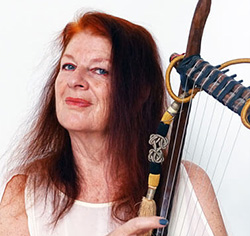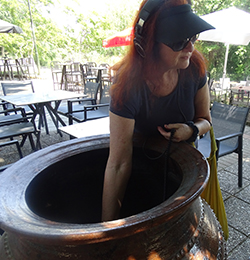
10 Commissions: ROS BANDT
As a musical celebration of the 10th Anniversary of Melbourne Recital Centre, 10 composers have each created a new work to be performed at the Centre throughout 2019.
The 10 composers represent a diverse range of musical styles but are unified by their critical acclaim and dedication to their craft. The series features an outstanding line-up of composers and performers, with each work designed to connect audience and performer in an intimate and personal way, making a significant contribution to the repertoire, across a variety of styles. The eighth individual to premiere their composition is Dr Ros Bandt. Her piece Celebration will be performed by the Australian Chinese Music Ensemble on Tuesday 3 December.

Ros Bandt is an inventive composer, musical instrument maker, sound installation artist, multi-instrumentalist, curator and researcher. She was the first woman to be awarded the Don Banks Composers Award, the Sound Art Australia Prize and the Benjamin Cohen Peace Prize in the U.S.A. She has been commissioned on four continents for her electro-acoustic installations, spatial music, sound sculptures, radiophonic works and is famous for her ‘sounding spaces’ of both ancient and industrial acoustic sites.
Ros has been a founding member of six ensembles including the Live Improvised Music Events, early music ensembles La Romanesca and Trio Avium, and the cross-cultural group Back to Back Zithers. She has pioneered acoustic ecology, sonic architectures and hydrophone recordings of fresh and ocean waters, and established the first acoustic sanctuary in the box iron bark woodlands of the Goldfields. Ros also has a PhD from Monash University and was awarded the Excellence for Research Award by the Arts Faculty at The University of Melbourne where she is now a fellow of eScholarship research.
What is your new work about?
Celebration brings into focus ancient man/nature relationships and the need for constant change, renewal and good governance. In 5th century BC China, the human values of balance, harmony and human ethics were symbolised by the phoenix (Sheng).
Celebration crosses boundaries of culture and genre. In the first movement, Waterfall, the overpowering generosity of nature can be heard in the 75 metre drop of a waterfall. Six channel electroacoustic fields build the context for the three scenes of the work. The waterfall sets the scene for an ancient Confucian pilgrimage, one of balance and responsibility observing balanced ethics. The downward glissandos of the plucked zither the Guzheng, activates the falling water until a solo from the ancient water mouth organ the Sheng, takes a nostalgic appearance as the phoenix, symbolising this almost forgotten world. This instrument was created over 3000 years ago.
Ethical human behaviour has changed with the greed-driven competitive drive for Prosperity, movement two, dominating recent landscapes and affecting the environment irrevocably. Sea Urchins, movement three, eat out everything in their path under the sea, caused by imbalances in the habitat and our persistent failure to take responsibility for the environment and each other. The lament on the Hulusi, the silk-gourd instrument of the oppressed Uighur people, is a call to change behaviour, look after each other, eat sea urchins and confront global warming now.

Blasting fireworks and cracking ceremonial fans and drums propel us to the modern mechanised China where lucky numbers and jackpots are delivered by the ensemble acting as machine for maximum output, lucky numbers spinning out of control. Once the money falls, the devastation of the depleted environment this has caused is heard in the chilling underwater environment where only spiky sea urchins exist. The Hulusi, the gourd clarinet of the oppressed minority groups in South west China, calls for mercy that we will change and care for the environment and each other as a species without greed or hatred.
The first and third movements are graphically scored allowing individual interpretation. The central notated Prosperity is notated presto for tutti ensemble without a rest to indicate the mindless over-activity of capitalist activity designed only for profit.
The cross-cultural scales in this piece oscillate between pentatonic scales to the more tonally directed central movement more typical of the western music tradition. The recorded Drone on the tarhu low D below the bottom note of the ensemble represents the bottom of the waterfall before the Phoenix enters. The musicians have contributed their ideas for Chinese ornaments and given a particular role each in the work. The use of the fire cracking sound of fans has been developed over many years in my investigation of Tai Chi and Taoist practices.
The work is funded by the Playking Foundation, one of two works commissioned for the Australian virtuoso Sheng player Wang Zheng Ting, director of the Australian Chinese Music Ensemble. I have collaborated with Wang Zheng Ting for many years, having met at Monash University many years ago. In 1997 Paul Petran from ABC’s Music Deli brought us together for a major work from the HuangPo to the Yarra and back, with composer Wang Gu Wei, which won a radiophonic award for the ABC.
This unique collaboration crosses the boundaries of space, time, musical genre, and cultures in an ever-changing environment demanding our cooperation and understanding.

